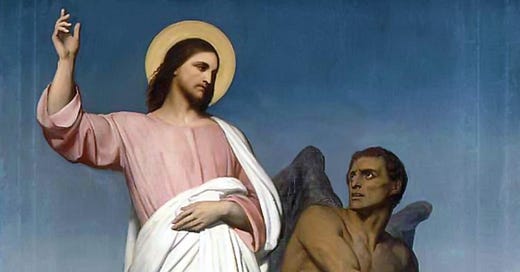An interesting thing I noticed about today’s Gospel—if Luke were a fictional narrative, it would be much more efficient to have the complainer in the crowd be the rich man building bigger barns. The story-within-a-story we get violates the “show, don’t tell” rule of writing.
If it were fictional.
But Luke apparently either witnessed this event, or interviewed someone who had, and felt that truthfully recording the parable-within-a-Gospel was more important than narrative efficiency.
Reading 1
Eph 2:1-10
Brothers and sisters: You were dead in your transgressions and sins in which you once lived following the age of this world, following the ruler of the power of the air, the spirit that is now at work in the disobedient. All of us once lived among them in the desires of our flesh, following the wishes of the flesh and the impulses, and we were by nature children of wrath, like the rest. But God, who is rich in mercy, because of the great love he had for us, even when we were dead in our transgressions, brought us to life with Christ (by grace you have been saved), raised us up with him, and seated us with him in the heavens in Christ Jesus, that in the ages to come he might show the immeasurable riches of his grace in his kindness to us in Christ Jesus. For by grace you have been saved through faith, and this is not from you; it is the gift of God; it is not from works, so no one may boast. For we are his handiwork, created in Christ Jesus for good works that God has prepared in advance, that we should live in them.
“The ruler of the power of the air” is an interesting phrase, so I looked it up. Apparently, it’s a reference to Satan (hence, “spirit that is now at work in the disobedient).
We usually think of Satan and Hell being below the Earth. But Paul gives us another image—of Satan blocking the way between us, on Earth, and God, in Heaven. He wants to sever that relationship, with sin.
But God is merciful and Christ died for our sins. Air can’t stop us from rejoining with God in His Kingdom.
Responsorial Psalm
Ps 100:1b-2, 3, 4ab, 4c-5
R. (3b) The Lord made us, we belong to him.
Sing joyfully to the LORD all you lands;
serve the LORD with gladness;
come before him with joyful song.
R. The Lord made us, we belong to him.
Know that the LORD is God;
he made us, his we are;
his people, the flock he tends.
R. The Lord made us, we belong to him.
Enter his gates with thanksgiving,
his courts with praise.
R. The Lord made us, we belong to him.
Give thanks to him; bless his name, for he is good:
the LORD, whose kindness endures forever,
and his faithfulness, to all generations.
R. The Lord made us, we belong to him.
Everyone can now give thanks to God, because He welcomes everyone, through Christ, into His Kingdom.
Alleluia
Mt 5:3
R. Alleluia, alleluia.
Blessed are the poor in spirit;
for theirs is the Kingdom of heaven.
R. Alleluia, alleluia.
Matthew added the phrase “in spirit” to indicate that anyone, no matter their financial class, can recognize their total dependence on God.
Gospel
Lk 12:13-21
Someone in the crowd said to Jesus, "Teacher, tell my brother to share the inheritance with me."
He replied to him, "Friend, who appointed me as your judge and arbitrator?" Then he said to the crowd, "Take care to guard against all greed, for though one may be rich, one's life does not consist of possessions."
Then he told them a parable. "There was a rich man whose land produced a bountiful harvest. He asked himself, 'What shall I do, for I do not have space to store my harvest?' And he said, 'This is what I shall do: I shall tear down my barns and build larger ones. There I shall store all my grain and other goods and I shall say to myself, "Now as for you, you have so many good things stored up for many years, rest, eat, drink, be merry!"'
But God said to him, 'You fool, this night your life will be demanded of you; and the things you have prepared, to whom will they belong?' Thus will it be for the one who stores up treasure for himself but is not rich in what matters to God."
I don’t think the person with the inheritance issue was trying to trick Jesus, unlike the Pharisees. But, as Jesus points out, he was still too focused on the things of this world.
So He tells one of the more easily understood parables in the New Testament. No matter how rich or poor we are, God is in control of our lives.



